FAMILY VICTORIES FROM YOUTH VILLAGES


ETHAN BECOMES A GUIDE FOR FORMER FOSTER YOUTH
ALSO IN THIS ISSUE:
• INTERCEPT ® PROGRAM HELPS FAMILIES HEAL
• YOUTH VILLAGES CELEBRATES 25 YEARS OF CHAFEE
• DONOR SPOTLIGHT: LOU JUNIOR MARIETTE

FAMILY VICTORIES FROM YOUTH VILLAGES


ETHAN BECOMES A GUIDE FOR FORMER FOSTER YOUTH
ALSO IN THIS ISSUE:
• INTERCEPT ® PROGRAM HELPS FAMILIES HEAL
• YOUTH VILLAGES CELEBRATES 25 YEARS OF CHAFEE
• DONOR SPOTLIGHT: LOU JUNIOR MARIETTE
FROM YOUTH VILLAGES EXECUTIVE DIRECTOR

I am always deeply grateful for the support we receive from people like you, but this letter is a different kind of call to action.
For the past year, I have shared the growing struggle youth “aging out” of foster care have in accessing services that support their success as adults. Increased costs and underfunded contracts have forced providers to pull back in some parts of our state. You, and other supporters, prevented any disruption to our services through your generous contributions. Without these vital services, many bright and capable young adults face difficult odds for success, and our system must be strong statewide.
In Oregon’s current legislative session, there are two priorities that would mark a meaningful investment in the success of youth aging out of care. The first is Senate Bill 911, which will provide an ongoing process to review costs for quality programs to keep pace with inflation. The second is a direct ask to the Ways & Means Committee to immediately invest to shore up these deeply underfunded programs, strengthen quality and improve access to services for young people impacted by foster care.
As I’ve previously shared, when a child enters foster care, the state of Oregon becomes their legal guardians. This means every single Oregonian becomes responsible for them. Will you take a moment to call or write your legislators and encourage them to prioritize young people impacted by our foster care system? Scan the QR code below to look up your Senate and House representatives.
Please take a moment to advocate — on their behalf — to your local representatives. It would mean so much to me, but more importantly, could positively impact the nearly 3,000 young people on a path to emancipate from foster care in our state. They are not alone.

Andrew Grover EXECUTIVE DIRECTOR OREGON andrew.grover@youthvillages.org
503-675-2232
Eli Pahl, Chair
David Durocher, Incoming Chair
MJ Dunne
Jenn Fortmann
Sister Guadalupe Guajardo
Joan Horstkotte
Amber Kelly
Ann Mestrovich
Jodie Oltmans
Pat Ritz
Colby Schlicker
Pete Stofle
Charlie Swindells
Youth Villages is a national leader in mental and behavioral health committed to finding the most effective solutions to help children, families and young adults overcome obstacles and live successfully. Working through direct services, partnerships with innovative public agencies and advocacy, we collaborate to bring positive change to child welfare, children’s mental health and justice systems. Our 4,500 employees serve more than 43,000 children and young adults in more than 100 locations in 27 states and the District of Columbia. Youth Villages has been recognized by the Harvard Business School and U.S. News & World Report and was identified by The White House as one of the nation’s most promising results-oriented nonprofit organizations.
How are we doing?
We’d love to hear feedback from you, so we can continue to improve and give you content you enjoy.
Use this QR code to complete our survey.

Scan the QR code above to look up your Senate and House representatives.
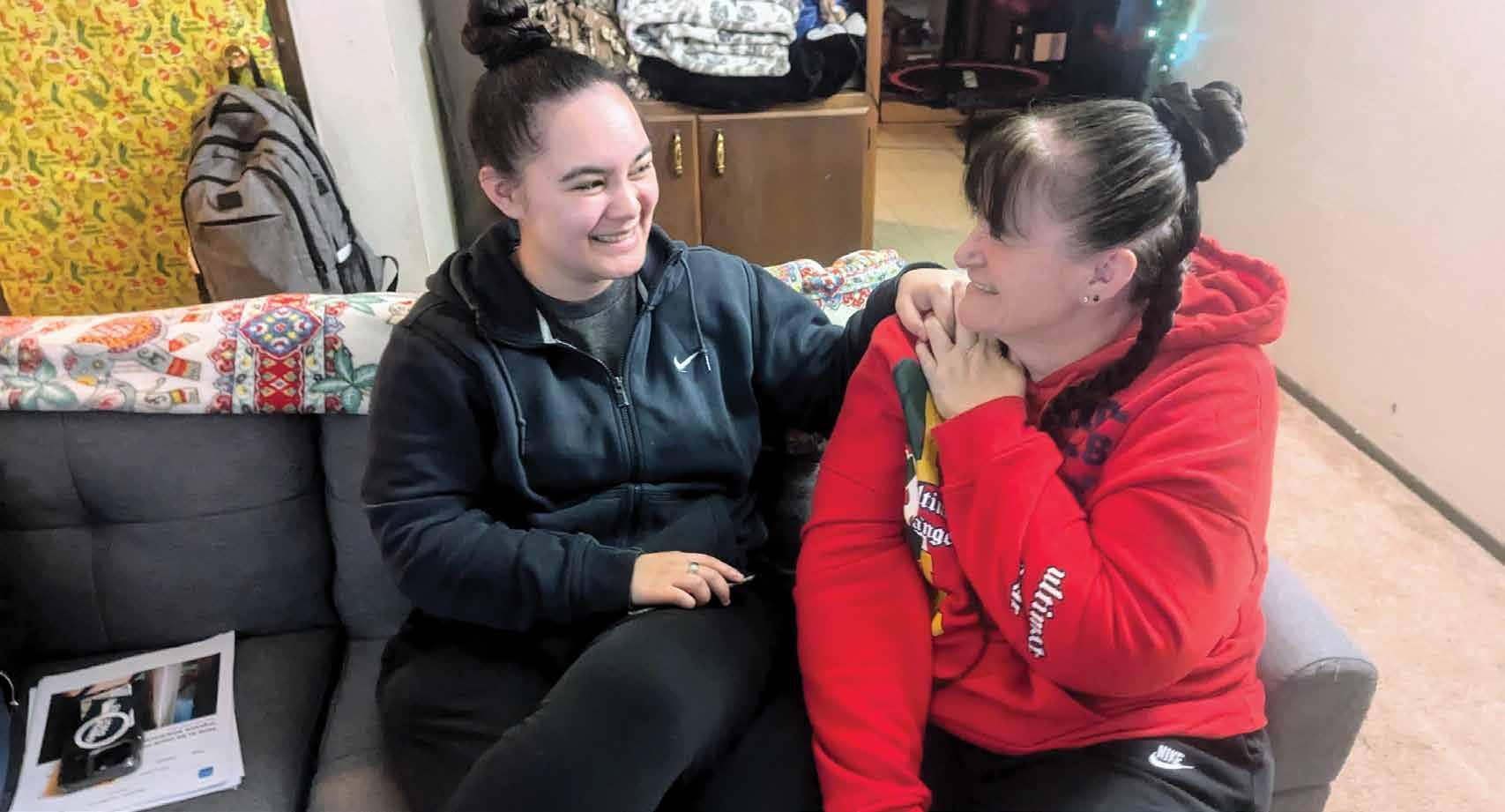
Katie Rosario sat on the gray couch in her family’s living room, aglow with Christmas lights on a November afternoon just before Thanksgiving.
The 17-year-old playfully shoved her mother, Robin Barquest, as she described her Christmas plans. She was going to get up at 4 a.m. to beat her mother to the Christmas tree and get a jump on presents.
“I am going to annoy the hell out of my mom with my stocking,” she said, laughing.
Over an hour-long meeting with a caseworker, the daughter and mother shared jokes at one another’s expense and spoke with an undercurrent of affection that parents of teenagers often wish for.
That’s new, they said. One year ago, Rosario, then a junior in high school, regularly refused to get out of bed. After earning mostly As and Bs as a freshman and sophomore, she was failing most of her classes at Roberts High School, said school counselor Coleen Van Dreal.
Conversations with her mom often devolved into screaming fights.
In desperation last spring, Barquest called the school asking if there was anything that might help them chart a better course. There was, she was told — a program called Intercept.

The program helps families work toward stability through intensive in-home visits — at least three per week. Workers teach skills like communication and coping, and help families get resources they need.
They’re available around the clock in case of a crisis so that families have an option besides police or the hospital.
Many of the young people in the program have severe behavioral problems, sometimes including aggression. Some may be suicidal or self-harming. The goal is to keep kids out of overtaxed and more intensive programs like residential mental health treatment, foster care or juvenile detention.
Intercept is run by Youth Villages, a national child services nonprofit that has a Portland office. The decade-old program has helped almost 300 children and their families in Salem. About 25 Salem families are currently participating, and the program has a waitlist of about 30.
“We really believe that kids do well when they can. And in order for them to do well, they need to develop skills, learn how to access resources, learn how to solve problems, learn how to deal with frustration,” said Andrew Grover, executive director of Youth Villages Oregon.
Intercept continues on page 4
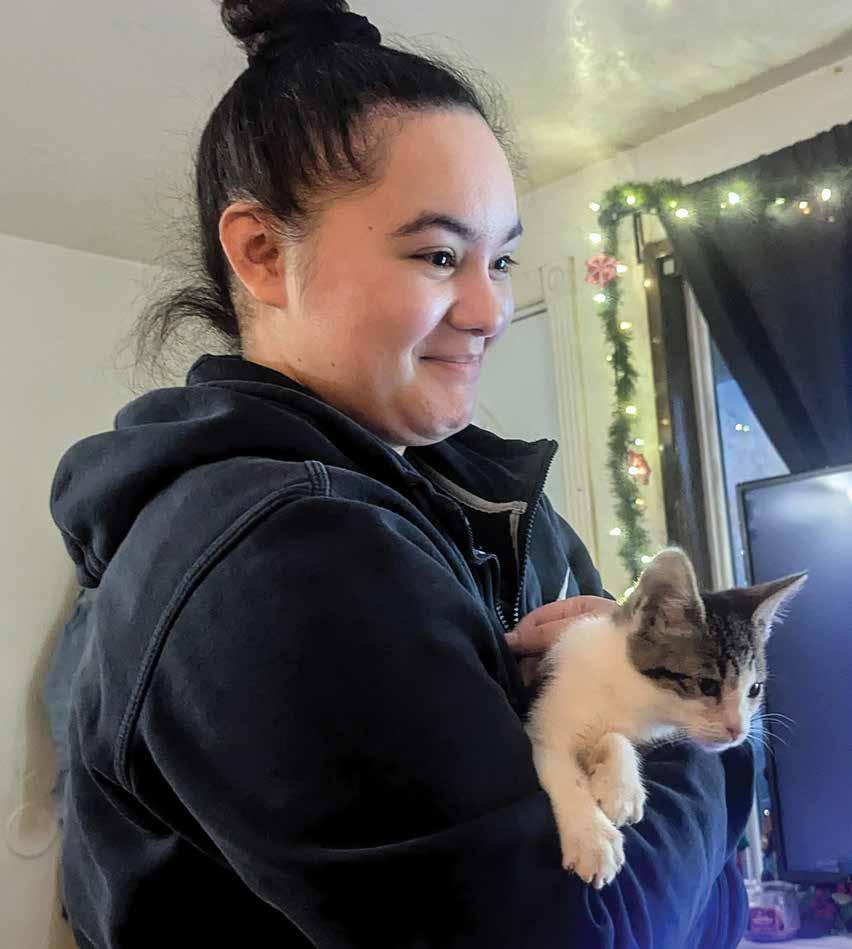
Intercept continued from page 3
Grover said programs like Intercept can help at a time when Salem is grappling with multiple challenges facing young people, including a rise in violence and an increase in mental health problems. The organization is working to create a new team so they can serve about 20 more Salem families.
“There’s not a silver bullet. There’s no one thing that any of us do that (will) be the effective solution,” he said. But schools, law enforcement and programs like theirs can work together “in a moment of crisis, or to prevent a moment of crisis.”
Rosario is the youngest of three sisters and grew up in a home that was often turbulent. Her mother was in an abusive and sometimes violent relationship for years when Rosario was young. Barquest lives with post-traumatic stress disorder and can’t work. Rosario’s older sisters didn’t graduate high school.
Van Dreal said Rosario was often very anxious in school. When she arrived at Roberts in the fall of 2021, she wore a hoodie with the hood ties cinched tight, leaving only a small piece of her face visible.
As months passed and Rosario got more comfortable, the ties would loosen. When she finally stopped wearing the hood, there was a small celebration.
But she continued to struggle with finishing full days of school, often becoming overwhelmed and leaving class.
“A lot of times Katie would get very distracted on things that are happening at home,” Van Dreal said.
By her junior year, Rosario said she preferred sleeping to dealing with school. She sometimes had conflicts with classmates who made fun of their peers in group chats or on social media.
She didn’t know how to share with her mom about what was bothering her. Barquest said she didn’t know how to get Rosario to open up. Short of physically dragging her daughter out of bed, she felt without options to help.
“I wasn’t really thinking about how it would make my mom feel,” Rosario said of her skipping school.
They began working with Intercept in April. Rogelio Larios in July took over from another Intercept worker.
The strain in the North Lancaster home was evident from the start. Larios said the mother and daughter couldn’t have a conversation without fighting.
“They would just start screaming at each other,” he said.
Larios, a former school counselor, worked with them so they would listen to each other’s perspectives and communicate when something was bothering them. Both had to learn how to have conflict without fighting.
“I still slip up too,” Barquest said. “I’m not perfect but I try.”
Larios began helping them advocate for Rosario at school, attending a meeting about her education plan, which allows her to leave class when she’s getting overwhelmed.
At the start of her senior year, Rosario said she had a teacher who told her she couldn’t get up and go.
“I ended up going off on a student and I just walked out,” she said.
After Larios and her mother met with school officials, she said her plan has been followed, which has reduced her anxiety. She spends one class period working in the student cafe, on her feet making drinks. The movement helps, she said.
She recently finished her signature drink, which combines peppermint, brown sugar, pumpkin pie spice and white mocha. She calls it the “Sweetie Pie.”
Van Dreal, the school counselor, said she wasn’t aware of Intercept before Rosario began working with them last spring. As a counselor at Salem’s alternative high school, she interacts with many social programs. She said some

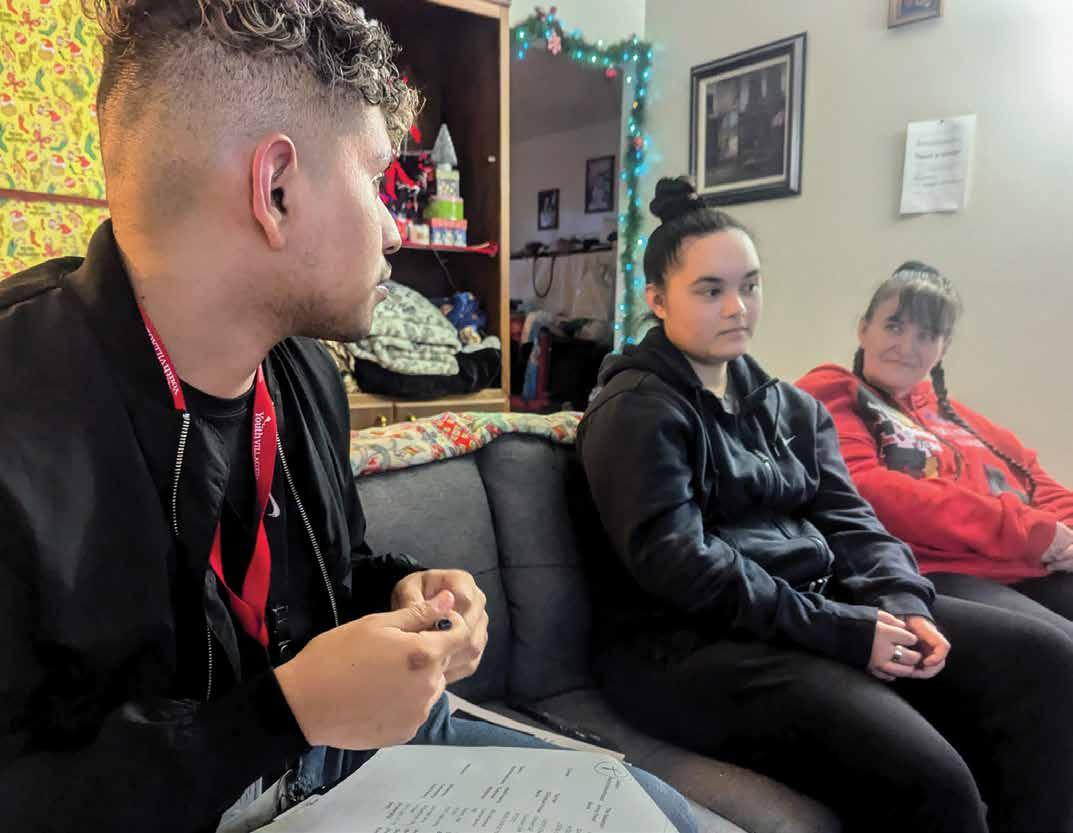
struggle to follow through despite good intentions because of employee turnover or limited resources.
Intercept, she said, stood out to her because workers stayed in touch with the school and did what they said they would do over several months.
Van Dreal said the effects are apparent. Rosario doesn’t leave class as often, she’s less angry and she’s better able to calm down when she’s upset.
“We really see a different young person than we saw when Katie was a freshman,” she said.
Intercept is intended to give families some of the benefits that might come from therapy, but is more comprehensive than weekly visits to a therapist could cover.
“We’re not the ones to kind of come in and just work with the young person and think that if we can help them gain insight that… things are going to be changed for the better,” Grover said. “We think of it as a family systems intervention where we work with the whole family in the context of their home.”

Their services are mostly paid for through the Oregon Health Plan, the state’s Medicaid program. Youth Villages workers follow up with families six and 12 months after they graduate.
Of young people who have graduated from Intercept in Oregon over the past two years, 89% didn’t have any trouble with the law, 85% were living safely with their family or independently, and 99% were in school, graduated or employed.
As she neared graduation from Intercept in late November, Larios sat across from Barquest in the family’s living room, talking through any issue that was on their minds. He was setting up Rosario with a regular therapist.
“I’m your training wheels and I’m going to be off,” he told them.
Despite her challenges as a junior, Rosario was on track to earn her diploma at the end of the year.
Lately, she’d been struggling with plans for her upcoming high school graduation. Her oldest sister lives on the streets and uses drugs. Rosario wanted her support at graduation, but
Rogelio Larios, a Youth Villages’ Intercept worker, meets with Katie and her mother in their home.
was worrying about how to talk to her about showering before the ceremony.
“If I hear anybody talking bad about my sister, I do not trust myself at all,” she said, balling her fists.
Her mom and her sisters were all the family she had, she said. As the first to graduate, it was important to her that everybody be there.
Larios and her mother walked through ways to convey the message, like practicing beforehand or writing it down.
“You still have some time to tell her, but the sooner the better in my opinion,” Larios said. “I know that’s going to be difficult but I really want you to challenge yourself.”
Barquest said she’s much more confident relating to her youngest daughter with the skills they’ve learned through Intercept.
“It’s the best thing I ever did because it’s helped heal my relationship,” she said. “She won’t get angry and just shut me out.”
Rosario, too, said she’s happier with her mom.
“We communicate a lot better with one another,” Rosario said.
The conversation veered into what Rosario might do after high school. She’s been thinking about becoming a therapist.
“I’ve been through a lot,” she said. “I want to make sure the people I’m helping know they’re not alone.”
This article originally appeared in the Salem Reporter.
Published Dec. 11, 2024
Rachel Alexander - Managing editor; Education/Nonprofits/City Government
Rachel Alexander - Photography

Like many who have experienced the child welfare system, Ethan’s path was filled with uncertainty and obstacles.
His journey began in his high school years when he lived with his biological mother who battled illness and substance abuse.
“My mom was admitted into a sober living house,” Ethan said. “While she was getting help, I started staying with a friend.”
With money tight, Ethan worked hard to save for housing for him and his mother. During this time, he connected with an open gym basketball group, where he met the coach who later became his foster parent.
When Ethan’s mother completed treatment, she purchased a trailer, and Ethan moved back home. His foster family stepped in and provided essential supplies and support. But they were concerned.
“They didn’t think it was a healthy place for me to live,” Ethan said.
Tragedy struck during his sophomore year when his mother passed away, leaving him without a home. His basketball coach and their family welcomed him in as their own.
As Ethan neared high school graduation, an Oregon Department of Human Services worker referred him to Youth Villages’

Independent Living Program, where Ethan immediately felt a connection with his specialist, Emma.
“They sat down with me and my foster family and explained the program,” Ethan said. “It was an amazing opportunity to learn how to ‘adult.’ Emma gave 110% of her time. She always made sure I was okay.”
From day one, Emma helped Ethan prepare for college and take control of his finances. From setting up a budget to managing grocery shopping and dorm essentials, she tackled the details that had left Ethan feeling lost.
Overcoming continues on page 15
Chafee, the federal funding stream that provides services to young adults who age out of foster care, now includes additional funds to receive post-secondary education and job training.

Young people who age out of foster care services at 18 experience serious challenges as they make their way in adulthood. Providing support, opportunity and resources for them is a core mission of Youth Villages and our supporters.
Youth Villages LifeSet™, extension of foster care and independent living programs were in Washington, D.C., to take part in a celebration of the 25th anniversary of federal support for current and former foster youth through the John H. Chafee Foster Care Program for Successful Transition to Adulthood program.
Thirty-five young people from 13 national organizations went to D.C. for two days of meetings themed: Our Voices, Our Vision — Policy Solutions. Young people advocated for a focus on healing, lifelong family connections and increased economic opportunities. The event was sponsored by the Journey to Success Campaign and partnering organizations, including Youth Villages. The young people are part of multigenerational advocacy that has brought about support and funding for former foster youth. In 1999, young people were influential in the passage of the John H. Chafee
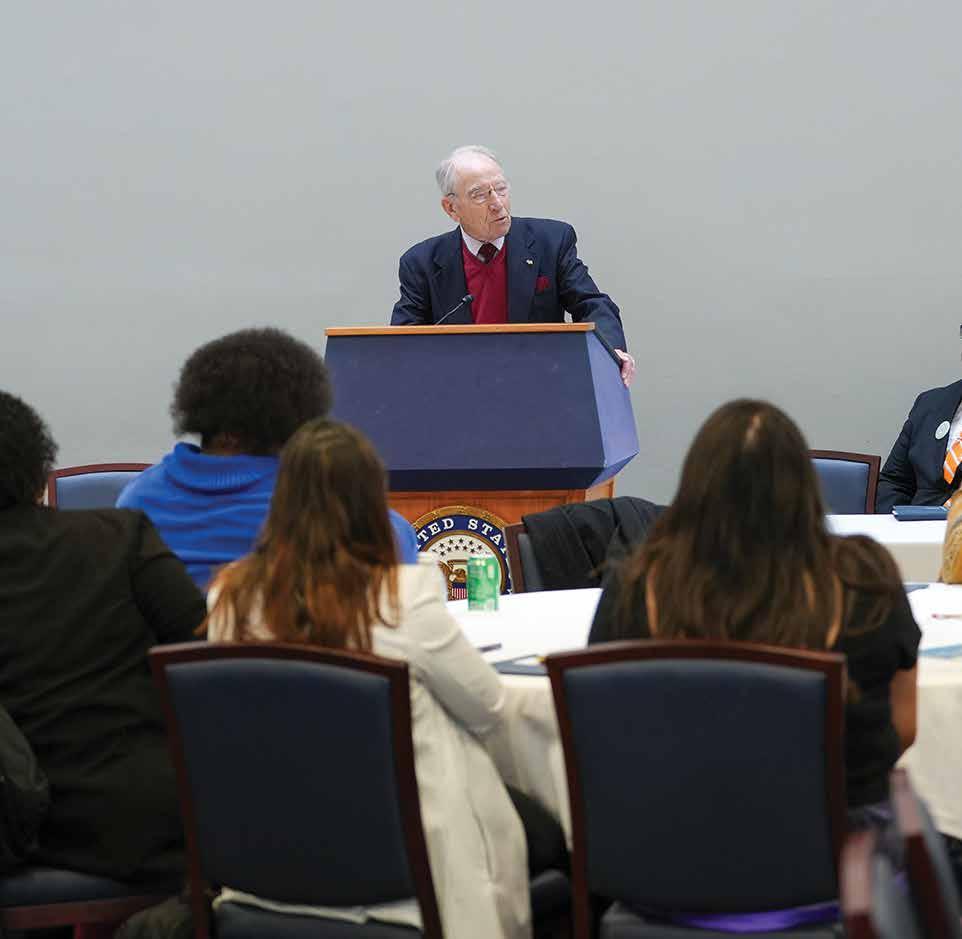

U.S. Senator Charles Grassley (R-Iowa), founder and chair of the Senate Caucus on Foster Care, speaks to young people and advocates.
Foster Care Program for Successful Transition to Adulthood. Funded by $143 million in 2024, the Chafee program is still the primary federal funding stream that states use to provide services to young adults who age out of foster care systems.
The Chafee program now includes additional funding for young adults to receive post-secondary education and job training. The National Youth in Transition (NYTD) database that collects information and outcomes on youth and young adults currently or formerly in foster care is also funded by the Chafee program.
U.S. Senator Charles Grassley (R-Iowa), founder and chair of the Senate Caucus on Foster Care, and U.S. Senator Amy Klobuchar (D-Minn), caucus member, spoke to the young people.
Grassley traced his decades of advocacy for foster youth to one young staff member, named Sarah,
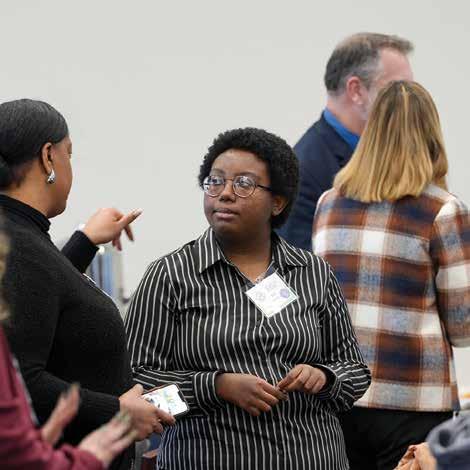
who had been adopted and brought foster care issues to his attention.
“Your advocacy is very important,” Grassley told the young people.
“My inspiration to work on these issues came from young people who experienced foster care, and you continue to inspire me today.”
He said the Senate Caucus on Foster Care began in 2008 to create an avenue for youth advocacy and bipartisan collaboration on these issues.
“We’ve been very successful in getting things done,” Grassley said.
“But there are some issues we still need to work on.”
Youth Villages is advocating for an increase in Chafee funding to ensure all 50 states can expand services to former foster youth to 21. Other bills would extend services to 26, an age when most parents are still providing financial support to their children.
Our board members are essential champions of our mission, offering their expertise, expanding our network of supporters, and providing the resources and strategic guidance we need to achieve our goals. Here are a few of their accomplishments on behalf of youth and young people impacted by foster care.
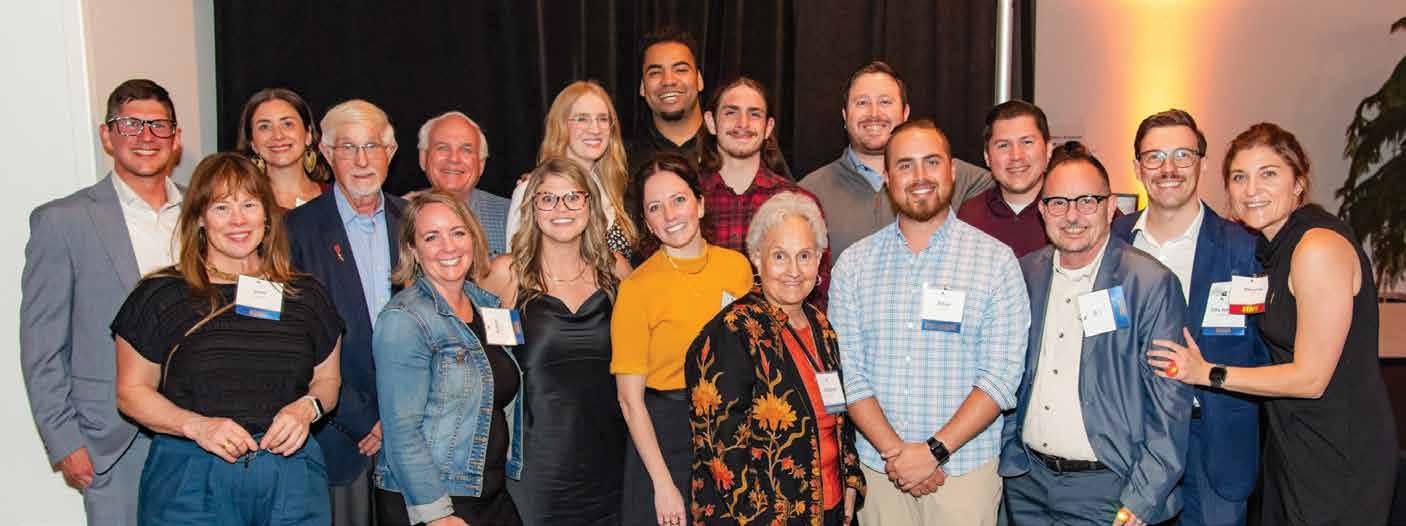
Local board and ambassador board members at Fall Celebration in 2024.
Elijah Pahl, Chair Kaiser Northwest
David Durocher, Incoming Chair CEM Services LLC
MJ Dunne OHSU
Jenn Fortmann The Standard
Sister Guadalupe Guajardo Sisters of the Holy Names of Jesus & Mary
Joan Horstkotte Emeritus Member
Amber Kelly OnPoint Community Credit Union

Ann Mestrovich The Standard
Jodie Oltmans
Kaiser Northwest
Pat Ritz
Stafford Villa Properties LLC
Colby Schlicker Lewis & Clark Bank
Pete Stofle WorkBoard
Charlie Swindells
Charles Swindells Law
33%
SHARE OF ALL GIFTS RAISED BY BOARD MEMBERS IN 2024
8
FUNDRAISING PAGES CREATED BY BOARD MEMBERS TO ENCOURAGE SUPPORT FROM THEIR NETWORKS
175
DONORS ENGAGED IN OUR WORK THIS YEAR BECAUSE OF BOARD MEMBERS
18
SPONSORSHIPS OR GRANTS TO YOUTH VILLAGES BECAUSE OF BOARD ADVOCACY
5
BOARD MEMBERS WHO ENGAGED THEIR COMPANY TO MATCH THEIR PERSONAL DONATION

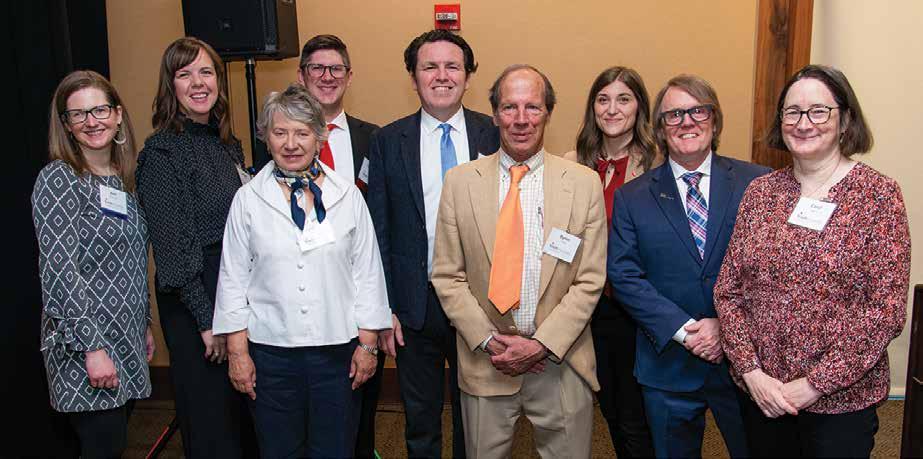
Local board members and Youth Villages leadership with Ritz Award honorees at the 2024 Growing Stronger Breakfast

Ambassador board member Devin Johnson with Enterprise volunteers at the annual Holiday Cheers & Volunteers gift-wrapping event.
■ Presented to more than 25 community groups including Rotary, Lions, Kiwanis and more to broaden our networks and build awareness.
■ Spotlighted Youth Villages Oregon on local news stations for enhanced visibility and represented our organization in broad coverage opportunities.
■ Leveraged social media to stretch our mission online.
Scan the QR code to the left and learn more about events in Oregon.

Fall
■ Rallied co-workers and corporate leaders to sponsor 63 wish lists for Holiday Heroes and raised more than $11,500 in cash to support the drive.
■ Supported annual events by hosting 24 tables at Growing Stronger Breakfast and Fall Celebration; and 12 teams in the Cornhole for Kids Tournament.
■ Advocated for young people under 18 in foster care who are in Youth Villages’ programs to be able to open a savings account at several financial institutions throughout Portland.
Lou Junior Mariette, Chair New York Life
Rikki Hooker, Incoming Chair Opt Real Estate
Nick Ball, Outgoing Chair City of Portland
Taylor Avritt Columbia Sportswear
Michele Beatty Enterprise Mobility
Ethan Eisenstein Nutanix
Blake Howell Reinisch Wilson, PC
Alex Hutchinson Miller Nash
Devin Johnson
Enterprise Fleet Management
Josi McDermott Boly:Welch
Brook McLane
The Standard
Trina Messinger
First Tech Federal Credit Union
Brittani Pomeroy Brown & Brown Northwest
Ashley Ruggles
JPMorgan Chase
Marcus Santangelo ZoomInfo
Daniel Whitmore Merina+Co
Beth Wilhelm
Kaiser Permanente

The teenage years are a tough time for most young people to handle. In her younger teens, Sharon Michelle faced more uphill climbs than many her age. She lived in three different homes, exposed to substance use and required to follow strict rules. She was never allowed to make friends, attend after-school activities and get a job, all the things her peers enjoyed.
The LifeSet program empowered Sharon Michelle to overcome her challenges and build a brighter future for herself.
The trauma she suffered took away her hope for a promising future. “I believed when I turned 18, I was going to run away and disappear,” Sharon Michelle said.
The challenges for Sharon Michelle started just before middle school when she lived with her mother who abused drugs. As a result, she was removed and placed with her grandfather. During her time there, she never enrolled or attended school.
Two years later, Sharon Michelle moved again, this time to live with her father, and re-enrolled in school. Despite missing the previous two years of school, she was placed in eighth grade.
“I kept myself reading those two years,” Sharon Michelle said. “Reading was how I got through a lot of things.”
The time in her father’s home quickly turned downhill due to substance use by her father and stepmother. Arguments broke out, and their anger frequently spilled over to Sharon Michelle.
“It got to the point where it was no longer just emotional abuse,” Sharon Michelle said. “They had gotten physical with each other. Over time, they began to get physical with me.”
At school, Sharon Michelle was a good student but was only allowed to attend class and nothing else. Her father made her come home immediately after school every day.
Finally, she talked with her school counselor who encouraged her to contact Child Protection Services. She did, but after CPS came by the home, the situation got worse. Friction in the home grew.
“It was a toxic household,” Sharon Michelle said. “I had been in a dark place for some time. Those suicidal thoughts came back that day, and I was taken to a medical facility.”
After her time at the medical facility, Sharon Michelle was referred to Youth Villages’ LifeSet program, and Erna Sveinsdottir became her specialist. LifeSet is a program that helps young people who have lived experience in foster or kinship care have a successful journey into adulthood.
The challenges, though, didn’t end. Sharon Michelle’s father and stepmother were against her specialist coming to the home, and Sharon Michelle still struggled with suicidal ideation.
“I was so mentally drained and depressed from living there, I had no motivation to do school at all,” Sharon Michelle said. “I was scared to leave because I couldn’t just tell them.”
LifeSet helps young people as they transition to adulthood by teaching life skills, goal setting, help in finding a job and housing, budgeting and more. With encouragement from Erna, Sharon Michelle moved out of her father’s home to a new place where she started working on her plan of finishing high school and attending college.
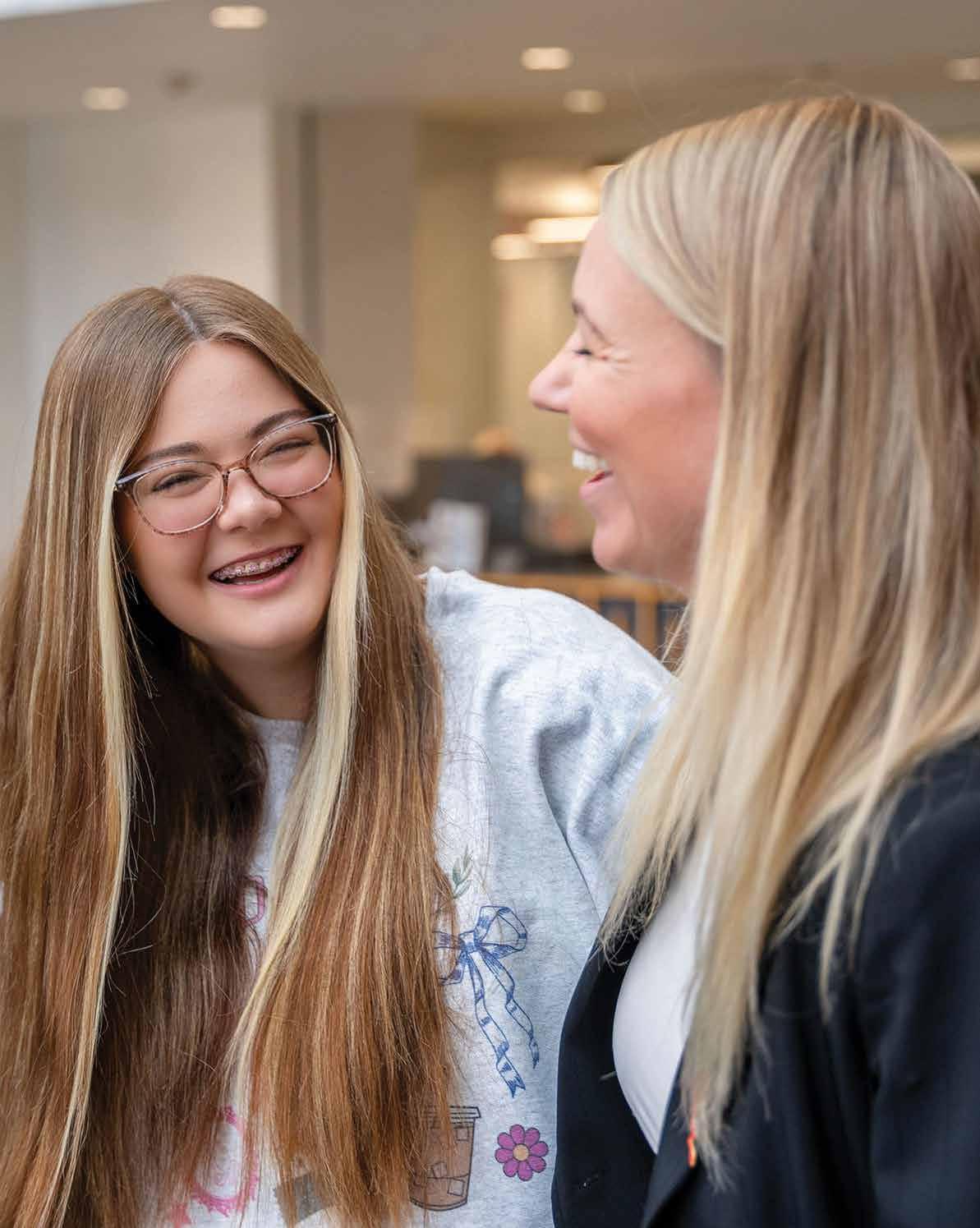
After her move, Sharon Michelle achieved her first goal: she graduated high school as an honor roll student and enrolled in nursing school.
LifeSet also taught Sharon Michelle, now 19, how to take better care of herself. After no doctor visits for five years, Erna helped Sharon Michelle arrange more than 40 appointments to catch up on her health.
“I’ve worked on taking care of myself more,” Sharon Michelle said. “No one had taught me those things, but Ms. Erna did. She always reminds me to take a day for myself.”
Aside from goal setting, LifeSet helped Sharon Michelle gain self-confidence. She has the courage to set boundaries with others and be more assertive. Most of all, she is happy.
“Before LifeSet, I would look at myself, and I was disgusted,” Sharon Michelle said. “I felt unworthy of living. Being in LifeSet, it gave me a new purpose, a reason to live.”
Now, Sharon Michelle is in her second semester of nursing school and doing well in her classes. She is a LifeSet Scholar, which provides additional support of a mentor to go along with her specialist.
“LifeSet has given me multiple reasons to live,” Sharon Michelle said. “They have done so much for me that it’s hard to put into words. I had nothing; now I have so much.”
For more information on LifeSet, scan the QR code or visit youthvillages.org/lifeset.
Ambassador Board Chair Lou Junior Mariette advocated for a $15,000 grant through New York Life’s Community Impact Grant Program benefiting youth aging out of foster care
How did you become involved?
I first got involved with Youth Villages through my good friend, Development Manager, Jonathan Whitmore, who is currently working with the organization. In 2022, he invited me to join the board, and his passion for their mission inspired me to learn more. As I dug deeper, I quickly saw how close their values align with my own. I’ve always been driven by a desire to make a tangible difference, especially when it comes to children and families.
Youth Villages offers a meaningful way to do that. Their mission, focused on helping at-risk youth find stability and success, really resonated with me. What they’re doing through their holistic, evidence-based programs creates real, lasting change, and I knew that joining the organization would give me a chance to be part of their impactful work.
What sets Youth Villages apart in its work with children and families?
What sets Youth Villages apart is their focus on evidencebased programs and their commitment to measurable outcomes. Unlike many organizations that may offer short-term fixes, Youth Villages takes a long-term approach by providing children and families with the tools and support they need to truly thrive. Their individualized care model ensures every family gets the specific resources and guidance they need, which makes a real difference in creating lasting change. That personalized approach is a game-changer in the social services sector.
Why do you support Youth Villages with your philanthropic investments?
My support for Youth Villages comes from both personal conviction and professional alignment. I’ve always believed in the power of giving back, and Youth Villages gives me a meaningful way to make a real impact in the lives of children and families facing tough challenges. From a professional
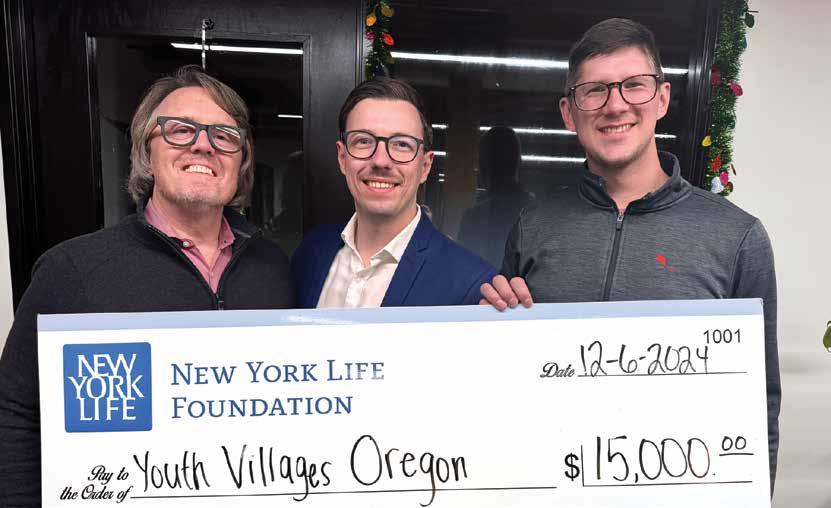
Oregon Executive Director Andrew Grover (left) and Development Manager Jonathan Whitmore (right) at a check presentation with New York Life Financial Services Professional, Lou Junior Mariette (center).
perspective, at New York Life, we’re deeply committed to fostering resilience and strengthening communities.
In fact, because of my philanthropic leadership, New York Life awarded a $15,000 grant to Youth Villages. The Community Impact Grants program is very competitive, with a rigorous evaluation process, and what stood out about Youth Villages was how clearly they demonstrated how our funding would address a critical need in the local community. Their passion and personal commitment to their mission were also key factors in why they were selected.
What I love about Youth Villages is that they align perfectly with the goals we prioritize at New York Life: providing sustainable, evidence-based solutions that lead to real, lasting change. Supporting their work isn’t just about contributing to a great cause — it’s about empowering families, strengthening communities, and ensuring a brighter future for generations to come.
What would you say to encourage others to financially support Youth Villages?
Youth Villages transforms lives. As the chair for the ambassador board, I’ve had the privilege of seeing firsthand how the organization changes the trajectory of children and families facing some of the most significant challenges. They have a proven track record of using resources efficiently and getting measurable results, which speaks to their commitment to making a real difference. When you support Youth Villages, you’re not just donating. You’re becoming a partner in creating hope, resilience and opportunity for those who need it most.
JULY 1 – DEC. 31, 2024
$50,000 to $99,999
OnPoint Community Credit Union
Marcia H. Randall Foundation
Pat & Trudy Ritz - Ritz Family Foundation
$25,000 to $49,999
Terry & David Durocher
OCF Joseph E. Weston Public Foundation
James and Shirley Rippey Family Foundation
Silver Family Foundation
The Swigert Foundation
$10,000 to $24,999
Bank of America
The James R and Diane Cameron Philanthropic Fund
Dutch Bros Coffee
Karen J. Fishel Fund of Oregon Community Foundation
Jackie Gordon
Tasca & Paul Gulick
Summer Lea Hillman Foundation
In-N-Out Burger Foundation
Kaiser Permanente
New York Life
Eric and Janet Parsons Family Fund of Oregon Community Foundation
Robert D. and Marcia H. Randall
Charitable Trust
The Renaissance FoundationStephanie Fowler and Irving J. Levin
Sarah & Mark Santangelo
VISIONARY
Pat & Trudy Ritz –Ritz Family Foundation
LEADER
Byron & Cynthia Grant
Darci & Charlie Swindells
PROTECTOR
Ron & Tammy Witcosky
BUILDER
Christopher Andersen
Marlow & Denice Hornberger
Scott & Teresa Learn
Gary R. Maffei
Jeff Mengis
Peter & Cassie Northrup
Steve Reinisch
Erika Aboites
Alliance Counseling Center
Andrea Barney
Susan Boman
Patricia Bradley
Sarah & Steven Cantor
Candace Elliott
Kathleen Faherty
Jenn Fortmann
Cheryl Grochau
Harold Goldstein
Nicole & Ian Galloway
Alex Hutchinson
Luke Lesh
Lou Junior Mariette
Mary Neal
Rachel Parrott
Janice Phillips
Fred Roach
Charlene Rogers
Kelle Summerfield
Robin van der Hoest
Cheryl & Richard Viskov
Daniel Whitmore
Beth Wilhelm

The Standard
Wheeler Foundation
Youth Villages Oregon EmployeesOur Family Campaign
$5,000 to $9,999
Davis Family Trust
Scott Eisenstein & Kelly Ritz-Eisenstein
Joan Horstkotte
Les Schwab Tire Centers
Malu, Ltd.
Oregon Community Foundation
Marilyn Patane-Halloran
Pete Stofle & Dawn Johnston
$1,000 to $4,999
John & Cheryl Bradley
Patricia Bradley
Blaine & Porecha Browning
Craig & Barb Cameron
Jeanine Carlson
CFM Advocates
Sharon & Bill Cleveland
Susan Conrad
Ron & Faye Driscoll
Candace Elliott
Enterprise Holdings, LLC
Jennifer Estner
Les & Nancy Fahey
Heather Hobson
Marlow & Denice Hornberger
Peter Cameron Hyzer & Jennifer Feeley-Hyzer
Robert Jones
New York Life Champions continued from page 13
Scott & Teresa Learn
Keith Legg
Leotta Gordon Foundation
Anita & Gerald Lindsay
Liz & Jesse Milan
Miller Nash LLP
Jim Mitchell & Elise Legère
Gary and Kary Myers Fund of Oregon Community Foundation
We’re excited about two legislative actions to support youth aging out of foster care. Senate Bill 911 ensures program costs keep pace with inflation, while a direct ask to the Ways & Means Committee seeks immediate investment to strengthen quality and access to these underfunded programs. Scan the QR code here to lookupyourSenateand Houserepresentatives.
Pearl Catering/Urban Venues PDX
Brittani Pomeroy
Steve Reinisch
Reinisch Wilson PC
The Stan and Madelle Rosenfeld Family
Donor Advised Fund
Ted & Holly Ruback
Josh & Kayla Sabraw
Marcus & Samantha Santangelo
Ron & Lynne Saxton
Sisters of the Holy Names of Jesus and Mary
Doug Stamm and Jackie Gordon Fund of Oregon Community Foundation
Johanna Thoeresz
Joseph & Shelley Voboril
Coni Westmoreland
Claudine & Geoff Wilson
Sally J. Wilson
Windermere Foundation
Suzanne Lang Younge Community Fund of Oregon Community Foundation
Lynzie Zawadzki


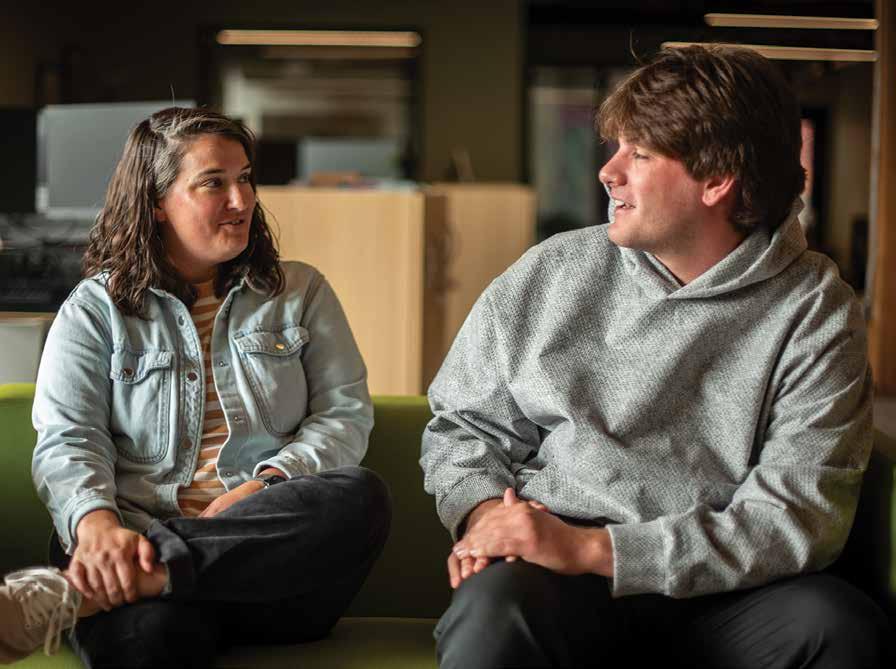
Ethan speaking with ILP Supervisor Katie Cleveland.
Overcoming continued from page 6
“I walked into my empty dorm room and had no idea where to start, but she helped me figure it all out,” Ethan said.
Fast forward to today, Ethan has earned a Bachelor of Science in Psychology. But his journey took an inspiring turn.
During a Youth Villages financial literacy class, he bumped into a former classmate, who now works for the organization.
“I asked, ‘How’d you get a job here?’” Ethan said. “Then, I met with Emma, and she helped me apply for a position she thought I’d be great for.”
Today, Ethan is a youth specialist for Youth Villages’ Independent Living Program, guiding former foster youth who face the same challenges as he once did. He has come full circle by turning his experiences into hope and has words of encouragement for those feeling lost.
“This is for the young adults who may be on the edge about going into a program like this and those who have questions about it,” Ethan said. “At the end of the day, you can learn so much from so many people at Youth Villages, and that is an inspiration.
“If you don't have that support in your life like many youth experience, then you can lean on your specialist. Questions can lead you in so many different directions, like helping you build a career and discovering what you want to do with your life. It can help you.”
THERE ARE NUMEROUS WAYS YOU CAN MAKE A DIFFERENCE FOR CHILDREN AND FAMILIES IN YOUTH VILLAGES’ PROGRAMS.
JOIN OUR EFFORTS BECOME A FORCE FOR FAMILIES
Partner with Youth Villages as a donor, emerging professional or corporation. Your support can have a direct impact on the future of the hundreds of children and families we help every day across Oregon.
Financially support Youth Villages
Donations | Donor-advised funds | Foundations
Become a superhero for our youth
Backpack Heroes | Holiday Heroes | Birthday Heroes
Become a corporate partner
Event sponsorships | Volunteering | Matching gifts
Learn about board leadership positions
Local Advisory Board | Ambassador Board for Emerging Professionals
Shauna Lugar, Development Director of Oregon shauna.lugar@youthvillages.org | 503-675-2256
Jonathan Whitmore, Development Manager jonathan.whitmore@youthvillages.org | 503-675-2206
Alexis Aviles, Development Coordinator alexis.aviles@youthvillages.org | 503-675-2218
x.com/youthvillages
facebook.com/youthvillages
instagram.com/youthvillages
youtube.com/youthvillages
linkedin.com/company/youth-villages YOUTHVILLAGES.ORG
5331 S. Macadam Ave., Ste. 287 Portland, OR 97239
Youth Villages is a private nonprofit that serves more than 43,000 children and their families each year from the following cities and states:
Alabama: Auburn
Arizona: Phoenix
Arkansas: Fayetteville, Little Rock
Florida: Lakeland
Georgia: Atlanta, Douglasville
Indiana: Bloomington, Columbus, Indianapolis
Kentucky: Lexington, Louisville
Louisiana: Metairie
Maine: Portland
Massachusetts: Boston, Marlborough, Springfield, Raynham, Woburn
Mississippi: Biloxi, Greenwood, Hattiesburg, Hernando, Jackson, Meridian, Tupelo

New Hampshire: Manchester, Plymouth
North Carolina: Asheville, Boone, Charlotte, Fayetteville, Greensboro, Greenville, Louisburg, Raleigh-Durham, Waynesville, Wilmington
Ohio: Dayton, Worthington
Oklahoma: Oklahoma City, Tulsa
Oregon: Bend, Portland, Salem
South Carolina: Columbia, Rock Hill
Rhode Island: Providence
Tennessee: Chattanooga, Clarksville, Columbia, Cookeville, Dickson, Dyersburg, Jackson, Johnson City, Knoxville, Memphis, Morristown, Nashville, Paris
Washington, D.C.